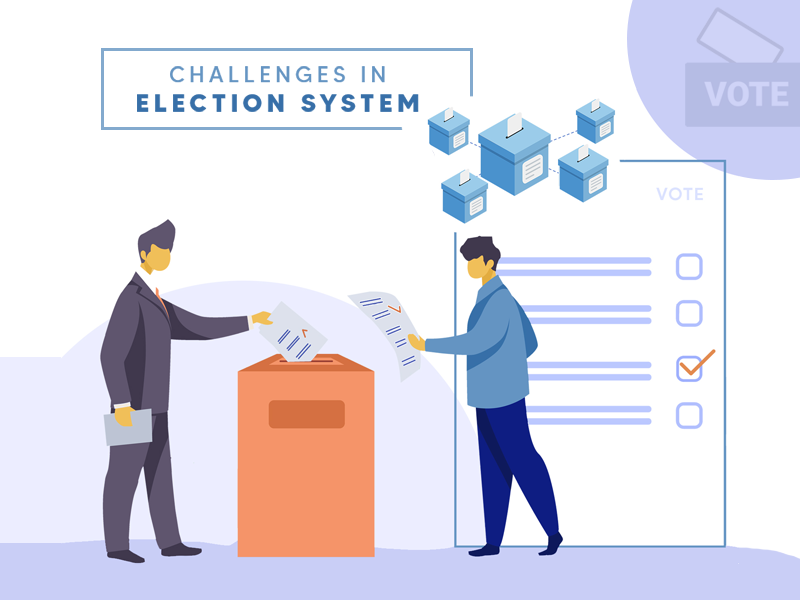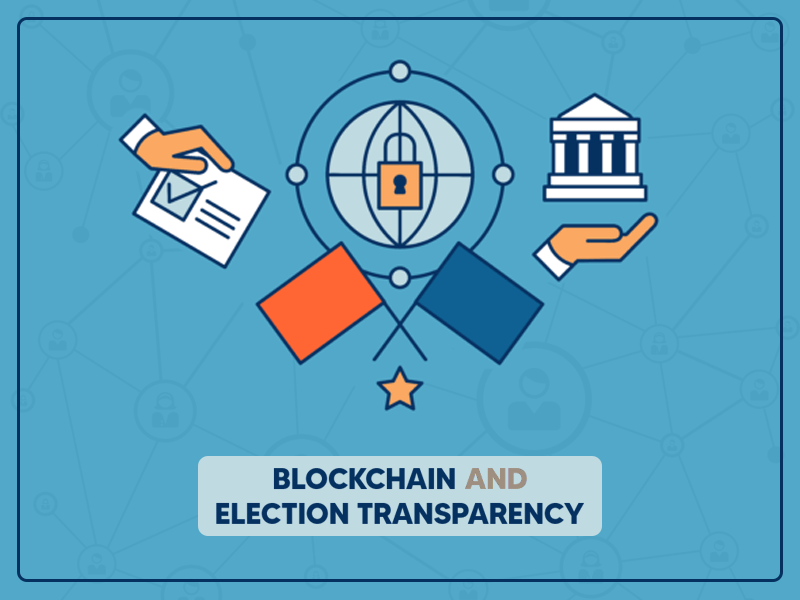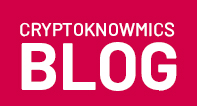Table of Contents
Headlines from Arizona in 2016 portrayed people were standing in a queue up to 5 hours to vote in just a primary election. They stated the reasons for these long lines as the reduction in voting locations to downsize the costs and many contended that at some place people were gathered because of the popularity of some candidates. In a time of technological advancement of hyperloop, driverless cars, drones to monitor defaulters, it will be justified to have advancements in voting technology which can turn the process into the hassle-free, transparent procedure with increased participation of voters. Blockchain enthusiasts believe that technology has the potential to revive the voting process. West Virginia became the first U.S. state to enable internet voting by blockchain in primary elections. While the voter participation within this platform was supposed to be small, the purpose of the administrators was to test the technology in a pilot project with no immediate strategies to perform it at a larger scale. In this article, we will discuss Blockchain and election transparency.
Challenges In Election System | Blockchain And Election Transparency

Many elections still use a paper-based system, leaving open huge security holes that could contribute to fraud and corruption, even interference from nation-state backed hacktivists. Election security includes the protection of election processes like registration databases, voting machines, other systems to manage the election, and systems that report & display results along with critical voting infrastructure from cyber attacks. Some election security methods rely on time-consuming manual processes. Elections are under peril from wicked actors that can infiltrate voting machines, reconstruct voter registration databases, coordinate fake campaigns, and more. Blockchain technology could help in reinventing the Election system. Let us discuss the major challenges in the system:
Before Election
Dissemination of Fake News
Prior to the election, dismantled opinions were spread through the various media especially social media with the help of fake videos, voice notes and many more. Because of targeted disinformation campaigns, voters face confusions in discovering fact-based sources to explicitly notify their vote. Digital hoaxes spread in the pre-election stages has a profound effect on the outcomes of the election. In the US midterm elections, specialists advocated that it moulded homegrown disinformation operations in a way that it looked like the foreign influence of Russia.
Hacked Registration Database Of Voters
The ability and civic duty of citizens to vote to get hampered after the attack of the registration database of voters. Extracting sections of voters likely to promote one candidate could dramatically swing a close election. An attack that destroys an entire state’s registration database could slow or even stop an election process. A cyber attack on voter registration databases is also prevalent in modern developed countries. These databases often contain personally identifiable information like names, addresses, phone numbers, and more. Hackers sell the data online in prohibited black web markets or utilise it to target voters with disinformation and evangelism.
During Election
Hacking Of Voting Machine
At the time of the election, hackers could temper results after exploiting the vulnerabilities in the machinery of voting systems. If the voting system digitally depends on any device, then it is vulnerable to cyberattacks or hacking. The major problem of the digital system is that threat is not associated with a single system but with an entire class of systems involved in the voting process just by attacking one point of disruption, thereby affecting millions of votes at once.
After Election
Misleading Election Reporting System
Manipulation in the reporting systems could lead to inaccuracy in voting results. Researchers at Belfer Center of Harvard advocated that once the automated data priorly spread the news among new media regarding outcomes of elections, attackers might use it to manipulate the data and tricking the news for announcing the wrong winner. The election system is tainted even in advanced democracies with accusations of fraud or external influence, application of technology to eliminate rigging is dominant. Public officials will have to understand the nuances of the technology and test feedback received from voters and administrators alike. They must consider the importance of Blockchain and election transparency to reviving the system.
Blockchain And Election Transparency

Electoral committees all across the world are considering blockchain technology as a solution to ensure election integrity. Blockchain voting use-cases continue to captivate the attention of the media, as countries and organizations explore the advantages like security, transparency, and efficiency a distributed ledger offers which will inevitably promote more confidence in elections worldwide.
Before Election
Verification By Cryptographic Techniques
Cryptographic techniques which ensure the security in the Blockchain network can aid in ensuring the source of digital content to verify the accountability. Basically, voters would only trust the media that is marked with a unique cryptographic identifier, which after cross-referenced with immutable records on a blockchain could establish beyond doubt about the origin of media. In this case, initiating a blockchain system for media verification in coordination with the government and non-governmental institutions can improve transparency at the pre-election stage.
Blockchain Voting With Mobile Apps
Infidels advocated that internet voting is insecure and that mobile superimposes layers of complexity which can further disintegrate security and transparency of the election process. Defenders of the mobile voting suggest that making elections available via mobile devices could increase participation of voters and blockchain technology can secure mobile internet voting. For instance, Voatz app practices facial recognition software to verify voters’ identities, compliant with West Virginia’s laws. Votes are saved on the blockchain, inside “digital lockbox” in the cloud which is made extra-tamper-proof via immutable distributed ledger technology. On the day of the election, county authorities unlock and collect the votes for tabulation. Other startups developing blockchains for elections include Votem, Follow My Vote, Votebox, and XO.1.
During Election
Digital Identification
Blockchain technology works on the decentralised model of consensus mechanism where the participants connected to network authenticate the transactions. Blockchain could aid in the management of voter identities on the permissioned distributed ledger. Blockchain elections require a combination of identity data like government-issued IDs and biometric data gathered during online registration for matching a voter with his or her digital identity in a government voter registration database. The government can designate a consortium of universities, non-governmental organizations, and others whose consensus authenticates identity and manages which voters can vote. Beyond the secure database use-case, mostly blockchain election needs extra layers of technology for efficiently validating voters’ identity, retaining ballots secretly, and letting voters track and validate votes.
After Election
After Election Audit Mechanism
Blockchain technology also extends voters transparency. Given the anonymous nature of blockchain, votes can be tracked, counted and compared by various sources while maintaining voter privacy. As blockchain records are immutable, any vote cast would not be subject to deletion. Instead, auditors could confidently count and verify all votes. A blockchain voting system would also offer encrypted results, thereby encouraging transparency while maintaining privacy.
With a public blockchain, it would permit every voter to audit each ballot to verify that reported vote totals are correct, without disclosing the identity or vote choice of each voter. Blockchain voting startups Votem and Voatz offer systems that allow voters to verify their own votes. Voters cast ballots and get QR codes attached to their vote. By scanning the QR code with another device, voters can convince themselves that it properly recorded their vote. The system does not let voters know with conviction that their vote was part of the ultimate election result, but no form of voting currently in practice offers that level of assurance.
Summing Up
Using blockchain for elections is worth more than just an experiment. It will make it more accessible for citizens to vote while abroad, irrespective of the distance and time. It is also a helpful tool for the election commission to sustain transparency in the electoral process, reduce the cost of conducting elections, streamline counting votes and guarantee that all votes are counted. Using blockchain, all data of the election process can be recorded on a publicly verifiable ledger while keeping the anonymity of voters, with results available instantly. In the future, we could see security experts and election officials gather to develop election infrastructure and processes that would be based on Blockchain technology.
Articles You May Read
- How Do Robots Find Their Best Use In Cryptocurrency Trading?
- Discovering Benefits Of Blockchain In Healthcare Sector
- Presenting The Best Blockchain Development Firms In India

